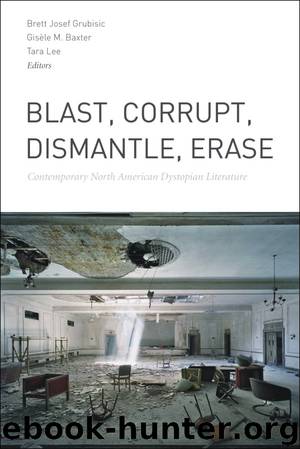Blast, Corrupt, Dismantle, Erase by Brett Josef Grubisic & Gisèle M. Baxter & Tara Lee

Author:Brett Josef Grubisic & Gisèle M. Baxter, & Tara Lee
Language: eng
Format: epub
Publisher: Wilfrid Laurier University Press
Published: 2014-03-05T16:00:00+00:00
Notes
1 “Las mujeres como tú van a cambiar este país” (89). Translations are mine unless otherwise noted.
2 Carlos Fuentes refers in this quotation to “America” the continent. Latin Americans also consider themselves “Americans,” not in the sense of citizens of the United State of America (who name themselves Americans), but as members of the entire multinational continent.
3 For more information on Latin American utopias, see Yohanka del Rio.
4 It could be appropriate, in this part of the chapter, to situate it by speaking about “formal” literature regarding Latin American dystopias and to discuss how the region sees itself vis-à-vis dystopian theorists from other traditions. By formal I mean theoretical works, rather than literary dystopias (i.e., novels, poem, etc.). I have taken a different route for, mainly, methodological reasons. As the Argentinean scholar Horacio Cerutti suggests in his seminal work Posibilidad, necesidad y sentido de una filosofía latinoamericana, when speaking about Latin America it is necessary to “situate” or remain metaphorically attached to Latin America’s thoughts, works, and literary output. The Latin American intellectual whose “intellectual production” remains vested in the “First World” demonstrates his/her historical disorientation and the absence of a situational positioning, foregoing the possibility of claiming roots within the region. In a sense, Ceruttti reinforces Fuentes’ assertion that America was not the last disorientation of the Western civilization (i.e., the First World). Our scientists, intellectuals, and thinkers (a category to which I belong) are educated within a First World context, studying its philosophies, ethics, and literary works. In that sense alone, we certainly share that “disorientation” Carlos Fuentes accuses the colonial powers of. Discussing one of the “utopias of Latin America,” such as the Mexican Revolution, from within that First World theoretical framework implies a certain epistemological disconnection, particularly when Latin American utopian thought claims a deeper connection to the Latin American homegrown political and social needs, as well as a firm grounding in the praxis. The task Latin American intellectuals, artists, and writers have at hand is to avoid being/writing/situating ourselves within the Others’ (in this case the Others are the First World writers and theorists) tradition and to reject the passive role of being the topoi of other people’s utopias, for Latin Americans need to “create and postulate our own Caliban Latin American utopia, based on a Latin American philosophy and to give birth to a new America, the homeland of a new justice” (Cerutti 22).
The notion of a “Caliban” Latin America is taken from the Cuban critic Roberto Fernandez Retamar, who takes one of the early utopian Latin American works, Ariel, and subverts its original meaning. In Ariel, Rodó proposes a return to an aristocracy of the spirit, counterposing it to the “Calibanian utilitarianism” and materialistic world represented by the United States. Ariel becomes thus the spirit of culture, refinement, and individualism; this individualism, however, is not based in the search for happiness (in this case a synonym for money), but rather in the universal values of culture as reflected in the arts, literature, and a cultivation of the spirit (reminiscent of the German geist).
Download
This site does not store any files on its server. We only index and link to content provided by other sites. Please contact the content providers to delete copyright contents if any and email us, we'll remove relevant links or contents immediately.
| African | Asian |
| Australian & Oceanian | Canadian |
| Caribbean & Latin American | European |
| Jewish | Middle Eastern |
| Russian | United States |
4 3 2 1: A Novel by Paul Auster(11050)
The handmaid's tale by Margaret Atwood(6853)
Giovanni's Room by James Baldwin(5878)
Big Magic: Creative Living Beyond Fear by Elizabeth Gilbert(4723)
Asking the Right Questions: A Guide to Critical Thinking by M. Neil Browne & Stuart M. Keeley(4576)
On Writing A Memoir of the Craft by Stephen King(4214)
Ego Is the Enemy by Ryan Holiday(3991)
Ken Follett - World without end by Ken Follett(3973)
The Body: A Guide for Occupants by Bill Bryson(3802)
Bluets by Maggie Nelson(3711)
Adulting by Kelly Williams Brown(3671)
Guilty Pleasures by Laurell K Hamilton(3587)
Eat That Frog! by Brian Tracy(3514)
White Noise - A Novel by Don DeLillo(3436)
The Poetry of Pablo Neruda by Pablo Neruda(3367)
Alive: The Story of the Andes Survivors by Piers Paul Read(3311)
The Bookshop by Penelope Fitzgerald(3228)
The Book of Joy by Dalai Lama(3218)
Fingerprints of the Gods by Graham Hancock(3213)
